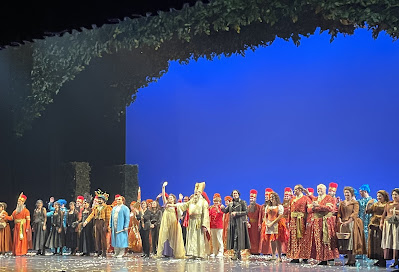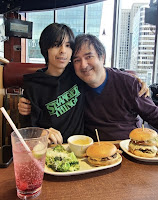Although Mozart’s music had often eluded me in my younger
years for its apparent simplicity even perhaps naivete, there is a lot of depth
embedded and enmeshed within all his work. It may look and sound simple, but it
is far from it. Although his music tends to be sprightly and youthful like
bubbling Champagne, there are also other feelings that pop to the surface and
shine through when perceived and taken in by the attentive ear, eye, and heart.
Let us, for instance, look at his Magic Flute.
The story itself is hard to summarize as its plot is too confusing and
convoluted to be put into words. There are also odd choices with the cast
itself like the character of Papageno, a feathery bird catcher who tends to strike us as
utterly silly but he is also quite amusing. The Queen of the Night with her three siren-like
hench women at her side can appear cartoonish at times. The elegant poise of
the baritone Sarastro seems a bit too pompous and self-important to be taken at
face value. And the story itself is beyond preposterous with many twists and
turns that make telenovelas look clear and straightforward in comparison.
And yet, despite it all, this is not slapstick or pure
comedy as two of the characters in this opera attempt suicide. Both want to
kill themselves for being jilted in love. Of course, this being a comedy, they
do not succeed but having characters seriously contemplate this option makes it
all look like a comedy that is walking on a tightrope with our fear and
preoccupation that at any moment the scales could tip, and the opera could
plunge and fall into disaster and tragedy. In a way, it is Mozart playing
with us since we know in advance that it is not going to turn bad, sour, or
tragic, so it makes him even more mischievous, but it does not change the fact
that there are still serious undertones in what is often, and I would say
unfairly, considered one of Mozart’s sillier or “lighter” operas.
What about the flute with its magical powers that can turn
sorrow and sadness into joy and happiness and bells that soften the hearts of
even the most wicked ones and hypnotize them or rather wake them up to goodness?
This may have fairy tale aspects to it, but it is not silly. Considering the
state of the world today, this is something we are seriously lacking in this
world of ours and these bells and whistles are much needed and sought after the
same way we desperately hold onto shards of hope.
I believe it is not childish at all. In fact, it points
towards the serious power of the arts; music in its purer and rarefied form has
indeed healing potential and propensities. It has the indubitable strength and
power to lift us out of the dumps, energize and inspire us, and motivate us beyond the present moment. It is our companion through thick
and thin and better and more loyal than a spouse, always there on our side to cheer
us up, to hug us, and to love us. No more faithful companion available at a
click and at the tip of our fingers has ever existed and in our technological
age, it has never been easier to gain access and entry into this marvelous
world. Because it deals with sounds and surpasses words with their evident
limitations no matter how poetic they may be, music goes straight to the heart.
The composer needs and relies upon the musician and vice versa
and each brings their own wishes, desires, and hopes to the table or the
concert stage as their longing is reflected and shines through via the
carefully crafted work of art that is presented to the audience. The page of
scribbled notes is turned and transformed into music played and interpreted by
each instrument and voice. Yet all of them are led and guided by the genius of
Mozart without whom neither the orchestra nor the singers nor the conductor nor
the audience members would have existed in this moment. It all comes from and flows
and returns to Mozart, but each performance is slightly different and more
unique than others before and others that come after them.
As I was sitting there with hundreds of strangers at the
opera, I felt that this wondrous music connected us all for a limited but
beautiful period of time. For an afternoon, we were all one and united as we
were dreaming and fantasizing in our own little private spheres and bubbles.
Yet it was Mozart who was guiding and conducting our dreams like a puppet
master pulling on our heartstrings, leading us to the precipice of potentially
impending death (at least twice) and yet getting us back to the shores safe and
sound again.
Oddly enough, I had the strange feeling and sensation that at
that moment Mozart actually cared about me. We had a personal connection, and it
was not just me appreciating and loving his music but also him caring for and about
me through his music. The magic flute went beyond a title or a prop in
the opera and was more than merely a symbol of a magically carved piece of wood
that turned people’s sorrows into joy. There was a personal sense and meaning
attached to it. No matter how deep my troubles were on that day or during that
week (and they were certainly knee-deep), they seemed to fly away for the length
and duration of the opera. I was fixed and transfixed and transported into
another world that looked like nothing like the one I lived in and yet had many
similarities and affinities.
First and foremost, it is a quintessential love story or
rather a bunch of love stories bunched together. Our hero Tamino sees a picture
of Pamina and is immediately smitten with love. Papageno, the lonely but chatty
bird catcher longs for his soul mate and meets her eventually in the shape and
form of Papagena. Despite a few glitches here and there, some twists and turns,
ups and downs, and surprises, all’s well that ends well. In the end, we are
happy and relieved to know that there will be not one but two weddings in the
offing and certainly more than one child soon gracing the bird family. A
spin-off of the married life of the Papagenos would be amusing or on second
thought perhaps not.
Yet, Mozart is nothing but straightforward, and, in fact, he
is cunning, playful, and even mischievous not unlike his colorful creation in
the shape of Papageno. Apart from adding surprising depth and shades of darker
hues to a story that could have been from the mill, he also plays with
conventions. As mentioned in a pre-talk of tenor Nicholas Burns, a typical and
stereotypical opera would have the deeper voices, i.e. baritone representing
the bad guy while the higher repertoires, tenor and soprano would be the good
guys or gals.
We seem to be on track since the alleged bad guy has
kidnapped the Queen of the Night’s beloved daughter, and if the good guy/hero
Tamino accepts the challenge, he will get the girl and be married to her. In a
sense, we also have the shaping and becoming of the hero who will not only have
to face difficulties and dangers but will also need to prove his love. The
whole thing becomes inverted as it turns into an initiation ceremony of a secret
and clandestine society that seems to mirror traditions and ceremonies of the
Freemasons of which both the librettist and the composer were allegedly part.
Yet, nothing is as it seems, and things start shifting and
moving in front of our eyes. The soprano was in fact evil herself and her most
famous aria with some of the highest notes humanly possible is in fact not an
angel but like the name implies she is affiliated with the darkness and evil intentions.
The baritone turns out to be a wise, just, and forgiving king and master at times reminding us of the Pasha Bassa Selim from “The Abduction from the
Seraglio” (Die Entführung aus dem Serail).
This is not the only inverting and upturning of
expectations. It is also reflected in the music itself. We have on one hand the
high classical and refined music that the queen embodies with beautiful and
elaborate melodies, and on the other hand, we have the folksy tunes that
Papageno symbolizes, another point made in the pre-talk. We have the commoner
versus nobility, and it is the first one we root for and the second one, we
tend to dislike. This also tends to be rather different from the predecessors of
the operatic tradition. It is furthermore a demonstration of general sentiment and
resentment just a few years after the French Revolution.
Finally, there is one more point I would like to make here. We
have music in the form of flutes, bells, and whistles that bring about change of
heart and soften seemingly implacable hearts and minds. Justice and order prevail
as the good are rewarded and elevated, while the repenting are forgiven and the evil
are punished for their deeds.
The ones we thought unlikely, Tamino who cries for help and assistance and wishes to be rescued as if he were a princess himself and not a hero faints at the sight of a creature in the opening act of this opera. Yet with some aid and more than a little help from friends, objects, and destiny, he eventually becomes a hero. In terms of love, he does not slay dragons but faces the elements and what must be the ultimate test, he must not speak to his beloved feigning indifference, which breaks her heart and almost kills her.
It reminded me of
the medieval maiden test where the knight must lie naked with his beloved but leave her
untouched, a tremendous amount of will, strength, and discipline being needed to
fulfill this deed or rather to struggle with oneself to remain passive and not do anything in
this case. On the other hand, Papageno is even more cowardly here and fails
to be initiated, but he does not mind as long as he has food, drink, and his
woman by his side, so he also receives his share of happiness.
Apart from all of this, we also have each of them coming into their own and not necessarily becoming heroes as in the case of Papageno but finding their own voices. Tamino is more himself and much less scared, while Papageno remains true to his nature and does not need to be other than he is to get what brings him happiness in life, plus he finds his female match in all the senses of the word. It is more than fitting to have an opera paving the way for finding one’s own voice, and it is also another reason why I do not think this opera to be silly but rather noteworthy and worth our time with its potential to bring about not only entertainment but also insight and even healing of our soul.
This is the final post of a three-part series on magic in different forms and formats:
The Magic Box: How Nothing is Impossible and Everything Is Part of Something
Birthday Magic: How and When it is OK to Feel Special and Entitled
And here's a post on another Mozart opera:
Mozart's Don Giovanni as the Tragicomic Symbol of Unbridled Capitalism




